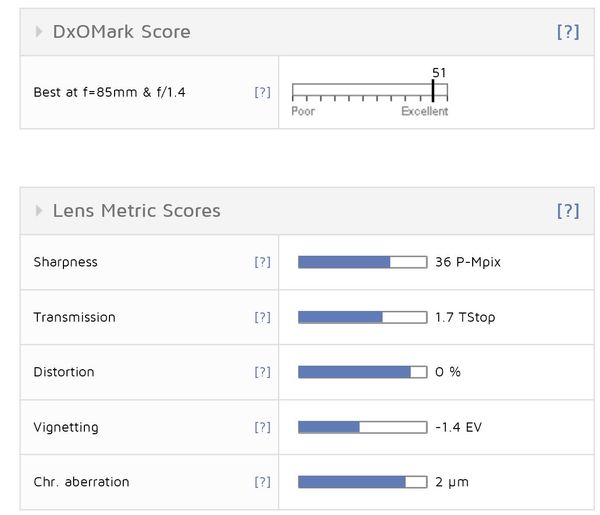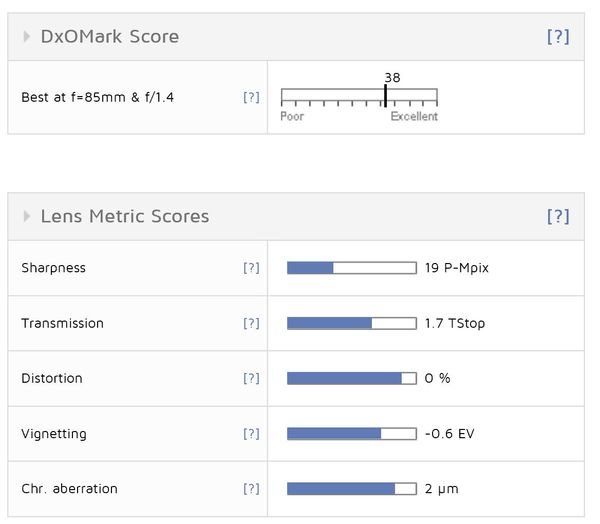Loss of IQ Using Full Frame Lens on a Crop Sensor?
Dec 11, 2017 17:53:29 #
Gene51 wrote:
You've watched the Tony Northrup video on this topic, I suspect. It should be dismissed as hogwash. Full frame lenses will provide equal and often better corner to corner performance than APS-C lenses on an APS-C camera.
Yes, I did watch his video plus I had looked at DXOmark previously. A lot of both don't make much sense. thanks
Dec 11, 2017 22:27:27 #
wdross
Loc: Castle Rock, Colorado
inbigd wrote:
I'm considering the SL2 with APS-C lens as a travel camera but want the option to use the bigger lenses on it sometimes. Will still use the EOS-1DS some also.
thanks
thanks
Again, only your best FF lenses will work the best on your APS-C body. The smaller sensors require better resolution from the lenses. 4/3rds resolves the image to 20mp. Since a 4/3rds sensor is a quarter the surface area of a FF sensor, if I wanted to use a FF lense to properly resolve an image for a 4/3rds sensor, the FF lense is required to be able to resolved an image for an 80mp sensor (80mp ÷ 4 = 20mp). There are not that many lenses that can resolve an image to that level. That is why there are very few FF film lenses are used or useful for 4/3rds cameras. Not enough resolution. But APS-C is a bigger sensor and, therefore, does not require as much resolving power as the 4/3rds do. Still, some lenses will resolve the image finer than others. It is best to test all the FF lenses that you would like to use on your APS-C to see which ones will meet your quality requirements.
Dec 11, 2017 22:49:08 #
mwsilvers
Loc: Central New Jersey
wdross wrote:
Again, only your best FF lenses will work the best... (show quote)
Yes, that is a caveat. A poorly resolving FF model would likely be an issue on a crop body, but so would a poorly resolving crop sensor lens. For instance, extensive testing a few years back determined that the aging Canon EFs 18-200 mm crop lens, although still in Canon's lineup today, will not resolve detail for any greater than a 15mp sensor. As a result using it on new Canon bodies with 24mp Canon sensors will not resolve the extra detail and would be a poor choice for those bodies.
Dec 12, 2017 00:18:37 #
inbigd wrote:
I've read conflicting info. online. Some say there... (show quote)
I do recall watching the Tony Northrup video some time ago, but I do also recall him talking about how the intended use of the lens is also a factor. And what he got into was that if you are using the full frame lens with a crop sensor to get greater image magnification, then this was a strong point of using these lenses.
This is in contrast to using the lens not as extra reach, but instead with normal photos at more modest focal lengths.
Personally, I use FF lenses on crop sensors a lot and really can't detect that anything is compromised. I am attaching a picture of Cormorants at about 600-700 feet using my Tamron 150-600mm lens (first version) at 600mm on an Olympus EM5ii with an adapter and using manual focus. This camera has a 2.0x crop factor and makes this the equivalence of 1200mm. If I had taken this with my full frame camera, the birds would have been only 1/2 as tall in the image and I would have had to crop a lot to get them to the same size. Of course, this distance is not an optimum distance for taking these types of shots, but there was a tiny island in the center of this lake and this was as close as I could get. And this shows that gaining reach is a good thing with using FF lenses on a crop body.
These cormorants have taken a liking to this poor branch and constantly sit on it. I have seen as many as 9 on the branch at one time and it is permanently drooping down close to the water where they can watch for something tasty to come swimming along.
Dec 12, 2017 02:50:26 #
Pablo8
Loc: Nottingham UK.
I have the option of FF and or crop sensor on my Nikon armoury. I feel more confident of using a FF lens at full-bore on a crop body (if conditions dictate), because the sensor is only using the centre portion of the lens circle of coverage ie, 'The Best'/ sharpest part.
Dec 12, 2017 03:17:49 #
I only have a couple of crop sensor lenses (kit lenses), the rest, the ones I use most, are full frame. They look good to me on my crop sensor cameras. Some of them great. None of them worse than crop lenses on the same cameras.
Some people over think these things.
Some people over think these things.
Dec 12, 2017 05:44:06 #
inbigd wrote:
I've read conflicting info. online. Some say there... (show quote)
You will find a lot of opinions on this and most of them are repeating myths. Attached are two charts showing DXO* performance data on the Sigma full frame 85mm f1.4 lens, the first is from the D800E (FF) and the second D500 (Crop). The D500 is two generations newer than the D800E so if there is technology bias it should be skewed in favor of the crop sensor.
As you can see from the data the lens performs much better on the full frame sensor compared to the lens' center portion on the crop sensor. The only improvement is vignetting. The myth is busted!
*DXO is the defacto standard for sensor and lens performance data.
Dec 12, 2017 06:13:03 #
Gene51 Yes, that video is utter rubbish. Worse still when he was challenged he showed he did not understand the subject at all. In fact I now regard anything he says with minimal regard. If he told me the time I'd look at my watch!
'Full frame' lenses on a crop sensor make great sense. The choice is not whether the lens is 'full frame' but about the quality of the lens. Of course the 'full frame' EF lenses will be more expensive than the crop sensor EF-S lenses as they are more expensive to design and manufacture, because they require greater 'coverage'.
'Full frame' lenses on a crop sensor make great sense. The choice is not whether the lens is 'full frame' but about the quality of the lens. Of course the 'full frame' EF lenses will be more expensive than the crop sensor EF-S lenses as they are more expensive to design and manufacture, because they require greater 'coverage'.
Dec 12, 2017 06:20:02 #
Gene51 wrote:
You've watched the Tony Northrup video on this topic, I suspect. It should be dismissed as hogwash. Full frame lenses will provide equal and often better corner to corner performance than APS-C lenses on an APS-C camera.
Tony Northrup reminds me of a guy who used to hang out at my uncle’s gas station. When you added up all things he had done, and the number of years he had done them, he was 105 years old. Well he sure looked great for a guy 105 years old.
Dec 12, 2017 06:28:39 #
Understand that people who write articles are getting paid to do so. Thus, they will write to make a living. This topic isn't the only thing that you can find two differing opinions. Your best bet is to take your crop camera and put your lenses on it. Take some very controlled test photographs and look at the results. That will be the only way you'll be able to determine if there is any loss or not.
--Bob
--Bob
inbigd wrote:
I've read conflicting info. online. Some say there... (show quote)
Dec 12, 2017 06:39:36 #
joer wrote:
You will find a lot of opinions on this and most o... (show quote)
Not relevant to the question. What you need is a comparison of two lenses - same focal length but one built for crop-sensor and one built for full-frame sensor - on the same crop-sensor camera.
Dec 12, 2017 07:11:55 #
rehess wrote:
Not relevant to the question. What you need is a comparison of two lenses - same focal length but one built for crop-sensor and one built for full-frame sensor - on the same crop-sensor camera.
You should re-read the op's post.
Dec 12, 2017 07:29:38 #
Gene51 wrote:
You've watched the Tony Northrup video on this topic, I suspect. It should be dismissed as hogwash. Full frame lenses will provide equal and often better corner to corner performance than APS-C lenses on an APS-C camera.

Dec 12, 2017 07:41:14 #
Rab-Eye wrote:
I don’t know if you consider this a loss of IQ, but if you put a crop censor lens on a FF body, you are not using all the megapixels available with a FF lens, simply because you are not using the entire censor with the crop censor lens.
There is no loss of IQ using a ff lens on a crop sensor body. In actuality, you are using the sweet spot of the lens and may actually be increasing the "effectiveness" of the image since it is ignoring the outside area of the lens (which typically or theoretically is where most aberrations occur).
Dec 12, 2017 08:21:04 #
mwsilvers
Loc: Central New Jersey
joer wrote:
You will find a lot of opinions on this and most o... (show quote)
Yes, as I've pointed earlier top quality FF lenses will work better on FF cameras than on crop bodies, but they will also work at least as well, and usually better, on crop bodies than lenses designed specifically for that format. Additionally, there are relatively few top notch optics available in crop designed lenses, not to mention a very limited assortment of focal lengths and apertures and usually poorer build quality. At the end of the day, generally the best lenses for crop cameras for a wide variety of uses are still those designed for FF cameras.
If you want to reply, then register here. Registration is free and your account is created instantly, so you can post right away.










